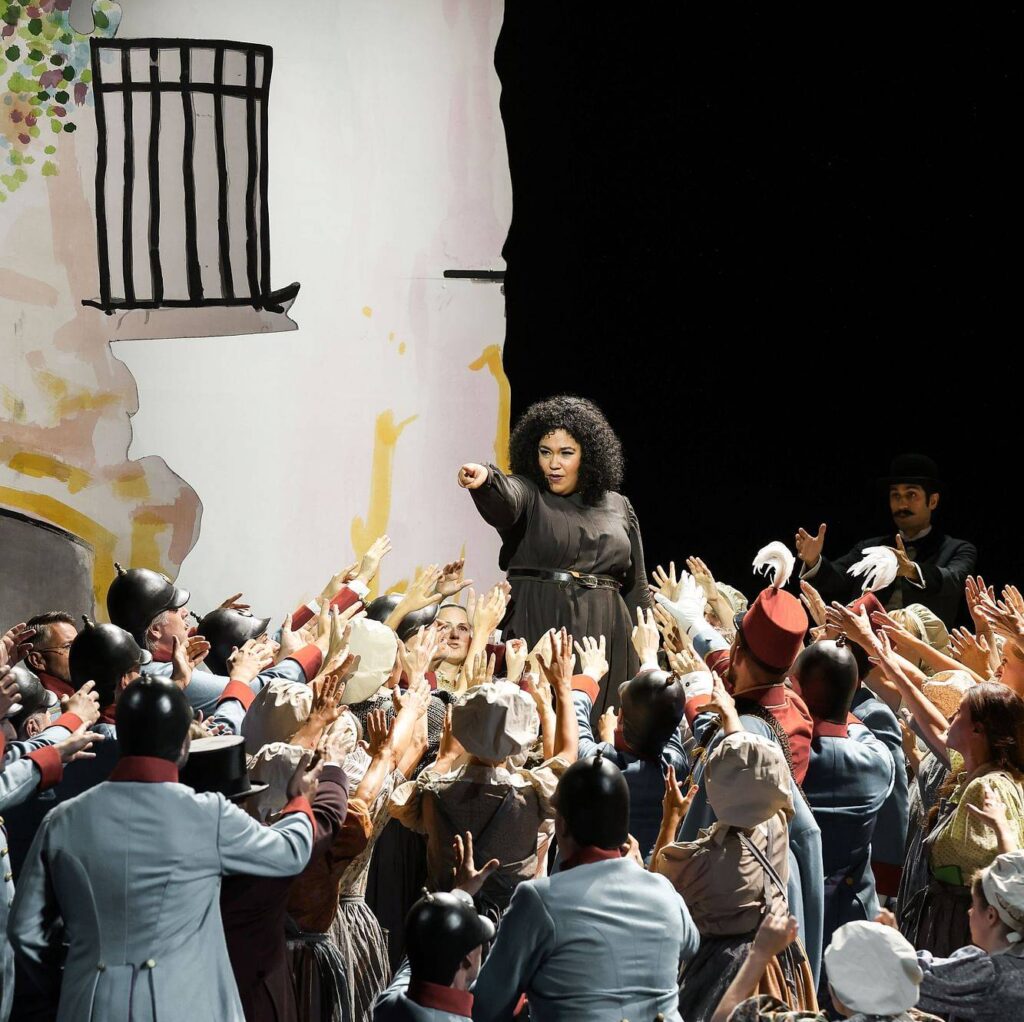Volksoper’s director (Lotte de Beer) challenges ‘the myths of Carmen’, as a free independent woman breaking her chains. Yet, by 19th century standards, Bizet’s Carmen was radical, a free spirit defying man’s society. A scandalous figure, who had to be tamed. In their misogyny, a transgressive, earning Don José ‘sympathy’ for a ‘crime of passion’. But ‘a feminicide’ to justify her killing? That’s exaggerated. The men’s motives are to do with sexual conquest. One will seduce her and tame her; another, (José), will ‘redeem’ her. Bizet’s music, incorporating gypsy rhythms, dance melodies, was revolutionary. And Meilhac and Halévy’s (La Juive) script implicitly sides with the social outsider.
So, fearing a deconstruction of ‘Carmen’, it’s reassuring that costumes (Jorine van Beek) appear ‘authentic, late-19th century. Opening with a ‘roll call’ on the main square, children with their mothers in frilly gowns, and fathers in stiff Sunday best; even a top hat. Volksoper’s Children’s chorus isn’t just cute; there’s even a chorus master. This (bourgeois) social context makes José’s later transgression more shocking. Carmen, sexual libertine, factory worker, is an outsider; the opposite of Micaela, José’s betrothed, virtuous, middle-class, churchgoer, beloved of his mother.
Ragged factory girls, are packing up boxes of cigarettes for export. A black woman, long, black hair (Katia Ledoux) , strips off her many layers of petticoats. To reveal her black costume, like a catsuit. As if throwing-off the stifling clothing is shedding the moral restrictions of the time.
On the brightly-lit stage, soldiers in royal blue, red-braided uniforms. They tease, even intimidate, a modestly dressed woman with a basket. The prim, bourgeois is Don José’s fiancé. That’s what’s at stake! In the opera, Micaela’s only seventeen, but sung by impressive soprano Julia Maria Dan. (She sings in French, but, being Vienna Volksoper, the dialogue’s in German!)
Cigarette workers, leaving in a group, ‘introduce themselves’ to the soldiers. Of course, Ledoux’s ‘Habanera’ –L’amour est un oiseau rebelle– is absolutely scandalous. A big woman, sensual, oozing sex, her mezzo rich, complex, powerful; and Ledoux’s got rhythm. The men fall over themselves, swaying, transfixed, following her every move. And musically, the stakes are high. Ben Glassberg’s Volksoper Orchestra are virtuosic, world-class, from Latin rhythms to breathtaking solos.
Ledoux, strutting her stuff in a borrowed soldiers tunic, throws a flower at an outraged Don José (Tamislav Muzek). When José goes to Micaela, the music is French ‘Grand Opéra’, their courtship, keeping a proper distance. Muzek’s José – tremendous tenor, with range, power, and emotional depth, quite a catch!- sings of marking his mother’s birthday.

Girls fight. Carmen is drawn in, they pull her hair. (Graphic, rough-and-tumble.) After the fight, Carmen’s arrest is problematic. Her arms held by two soldiers, the scene, one of ‘police’ violence, is overlooked by Lieutenant Zuniga (Alexander Fritze), who’s previously made a pass for Carmen. But Carmen, who admittedly cut a girl with a knife- insolently sings a gypsy ditty, Tralalala: I’ll tell you nothing.
She teases her captor, Don José, speaking in German, (here the oppressor’s language). Carmen finally admits she’s a gypsy, but ‘José will pity her as he loves her’. Forbidden to talk, she softly sings a seguidilla about a corporal she might love, ‘By the ramparts of Seville.’ José, entranced, loosens her ropes. The scene is restless, exotic. Muzek erotically plays with the rope he’s measuring, while Ledoux, feline, is stroking herself, like a big black cat.
The casting of Ledoux is not simply ‘political’: redressing the lack of black singers- under-represented even on today’s opera stage. But, arguably, a black, mixed-race Carmen in Seville is historically accurate.
Act 2 is announced by a scarlet-red curtain. Sensational theatre! Ledoux, in black, stands on a table overlooking soldiers in red jackets. Two gypsies play guitar, another two singing, and dancing. Carmen observes them, ignores an officer’s propositioning, and sings the iconic ‘gypsy’ song Les tringles des sistres, Her friends Mercedes (Sofia Vinnik) and Frasquita (Alexandra Flood), join Carmen singing the refrain; the dance frenzied, Carmen collapses. Played by Glassberg’s Volksoper Orchestra, so fast we didn’t have time to applaud.
and sings the iconic ‘gypsy’ song Les tringles des sistres, Her friends Mercedes (Sofia Vinnik) and Frasquita (Alexandra Flood), join Carmen singing the refrain; the dance frenzied, Carmen collapses. Played by Glassberg’s Volksoper Orchestra, so fast we didn’t have time to applaud.
Against Volksoper’s star-filled sky, in Lillas Pastia, Carmen is pestered by Zuniga, But, heralded by his signature toreador music, all eyes are on Escamillo, in the fabulous pageant. Escamillo, baritone Josef Wagner, is surrounded by women fans. Vivat le Torero! The Toreador Song- jaunty, irresistible, boastful- bewitches ladies in their frilly, ballooning satins. Wagner’s Escamillo is older, more mature, an egotist (sexual predator?) ‘Now, Carmen, what would you say, if I love you, and want to be loved by you?’ Ledoux responds coolly, love me as you will, but my love for you, forget it!
José under suspicion, is freed and Carmen warms to him. She make love to the sound of castanets (metal plates). They make a terrific duo; there’s real sexual tension between Ledoux and Muzek. He’d even kept her gold coin for his release: but incensed Zuniga’s still stalking her. Haunting cor-anglais accompanies Muzek’s romantic tenor. She dances for him, with castanets, humming to calm his jealousy.
Then his bugle call! She’s furious, his duty overrules her passion.( You don’t love me!) – He’d kept the flower she’d thrown him! – But if he really loved her, he’d follow her to the mountains! She rifles through his things, and holds his gun. Then she sits atop, José her captive. The sex is cut short. Adieu! Zuniga’s come to arrest him. They fight, Carmen intercedes, Zuniga’s roughed-up, stripped, thrown out. (No turning back for José.)
So far De Beer’s production has refreshed Bizet’s masterpiece. But opening Act 3, it’s post-modern: an alternative opera house- boxes facing us back-of-stage, audience in modern dress. But on Volksoper’s stage, it’s like a Roma camp. All sorts of contraband being traded. Ledoux stands bewildered, shivering, and is given a cardigan. Jose talks about a ‘respectable woman’.- Go to her!
Carmen’s friends, Frasquita and Mercedes, are reading tarot cards; for Carmen, they predict death. Carmen joins them for the trio, Toujours l’amour. (Are they ‘prostitutes’?) They have the men crawling on their knees for sexual favours.
The opera’s conflicting moralities- Carmen’s friends, socially marginalized- is pointed-up in Micaela’s aria. She’s found her way to the smugglers, hiding behind ‘rocks’, to ‘rescue’ José. Dan’s superb soprano sings movingly of overcoming her fear through her religious faith. Beautiful orchestral accompaniment, especially horn solo. (But the ‘audience’ cheers on stage were a distraction.)
Micaela witnesses the near-fatal fight between Jose and Escamillo, from gun shot to a knife fight. Escamillo’s only saved by Ledoux’s intervention. Impassioned, virtuoso singing (Dan and Muzek) on José’s parting. Then José forces himself on Carmen, brutally holds her in an arm-lock. Background, orchestral murmurs of Escamillo’s toreador theme.
Straight into Act 4, Ledoux on a bare stage. Outstanding orchestral playing- wind and brass- enervated, rhythmic. We see Ledoux as a waitress in dark maroon, white-lace apron, obviously Escamillo’s servant (and sexual concubine). She pulls off her uniform, and defiantly smokes a cigarette.
Now a sensation! On arched stage-within-a stage, the toreros parade, in their splendid attire, idolized by fans. Chorus and orchestra, on a high, capture Bizet’s musical excitement. Toreros in ‘authentic’ costumes, perform traditional dance movements- a true ballet sequence. We’ve rarely heard it so good, seen anything quite like it!
Carmen’s helped out of her servant’s uniform. She sits morose. José arrives, still-soiled white shirt, red soldier’s tunic and pants. He pleads with her. – She, Ledoux emotionless, Nous sommes fini, entre-nous. . Against the heated, desperate José, Muzek’s acting and vocals exceptional. He pins her to him. She, unmoved, isn’t afraid of him.
 They fight on the Toreador inner-stage. Laisser-moi passer! José brings out a knife and lunges at her. We hear, background, ironically, Escamillo’s Toreador refrain. Tragically, Carmen lies, body half-hanging out, Ledoux’s head-facing us. High drama. Performed immaculately, no histrionics. But we didn’t need the on-stage, ‘Post-modern’ applause. A black-mark to De Beer’s moving production. Musically- exceptional orchestra, outstanding cast- it had everything. PR. 24.9.2024 ©
They fight on the Toreador inner-stage. Laisser-moi passer! José brings out a knife and lunges at her. We hear, background, ironically, Escamillo’s Toreador refrain. Tragically, Carmen lies, body half-hanging out, Ledoux’s head-facing us. High drama. Performed immaculately, no histrionics. But we didn’t need the on-stage, ‘Post-modern’ applause. A black-mark to De Beer’s moving production. Musically- exceptional orchestra, outstanding cast- it had everything. PR. 24.9.2024 ©
Photos: Tamislav Muzek (Don Jose), Alexander Fritze (Zuniga); Katia Ledoux (Carmen), Karl-Michael Ebner (Remendado), also Featured Image; Volksoper Chorus © Barbara Pállfy/ Volksoper Wien

